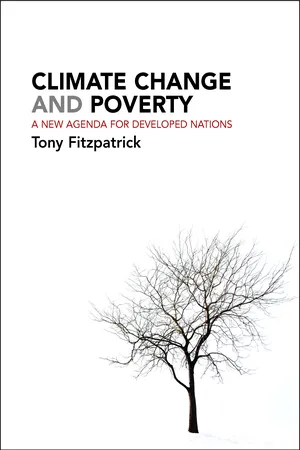![]()
References
Adam, B. (1990) Time and social theory, Cambridge: Polity.
Adam, B. (1998) Timescapes of modernity: the environment and invisible hazards, London: Routledge.
Adam, B. (2004) Time: key concepts, Cambridge: Polity.
Adebowale, M. (2008) ‘Understanding environmental justice’, in G. Craig, T. Burchardt and D. Gordon (eds) Social justice and public policy, Bristol: Policy Press.
Adger, W.N., Brown, K. and Waters, J. (2011) ‘Resilience’, in J. Dryzek, R. Norgaard and D. Schlosberg (eds) Oxford handbook of climate change and society, Oxford: Oxford University Press.
Agyeman, J. (2013) Just sustainabilities: policy, planning and practice, London: Zed Books.
Alcock, P. (2006) Understanding poverty (3rd edn), Basingstoke: Palgrave Macmillan.
Aldred, R. (ed) (2011) Social justice, social policy and the environment, Special Issue of Critical Social Policy, vol 31.
Anderson, E. (2010) ‘Justifying the capabilities approach to freedom’, in H. Brighouse and I. Robeyns (eds) Measuring justice: primary goods and capabilities, Cambridge: Cambridge University Press.
Anderson, W., White, V. and Finney, A. (2012) ‘Coping with low incomes and cold homes’, Energy Policy, vol 49, pp 40-52.
Archer, D. and Rahmstorf, S. (2010) The climate crisis: an introductory guide to climate change, Cambridge: Cambridge University Press.
Aurand, A. (2010) ‘Density, housing types and mixed land use: smart tools for affordable housing?’, Urban Studies, vol 47, pp 1015-36.
Baker, W. (2006) Social tariffs – a solution to fuel poverty?, Bristol: Centre for Sustainable Energy.
Ballingall, J. and Winchester, N. (2010) ‘Food miles: starving the poor?’, The World Economy, vol 33, no 10, pp 1201-17.
Barker, T., Ekins, P. and Foxon, T. (2007) ‘The macro-economic rebound effect and the UK economy’, Energy Policy, vol 35, pp 4935-46.
Barling, D., Lang, T. and Caraher, M. (2002) ‘Joined-up food policy? The trials of governance, public policy and the food system’, Social Policy & Administration, vol 36, no 6, pp 556-74.
Barry, B. (1999) ‘Sustainability and intergenerational justice’, in A. Dobson (ed) Fairness and futurity: essays on environmental sustainability and social justice, Oxford: Oxford University Press.
Barry, B. (2005) Why social justice matters, Cambridge: Polity.
Bateman, M. (2010) Why doesn’t microfinance work? The destructive rise of local neoliberalism, London: Zed Books.
Bauman, Z. (1998) Globalisation: the human consequences, Cambridge: Polity.
Bauman, Z. (2000) ‘Time and space reunited’, Time & Society, vol 9, nos 2-3, pp 171-86.
Bauman, Z. (2005) Work, consumerism and the new poor (2nd edn), Maidenhead: Open University Press.
Beaumont, J. (2006) ‘London: deprivation, social isolation and regeneration’, in S. Musterd, A. Murie and C. Kesteloot (eds) Neighbourhoods of poverty, Basingstoke: Palgrave Macmillan.
Beck, U. (1999) World risk society, Cambridge: Polity.
Beck, U. (2002) ‘The cosmopolitan society and its enemies’, Theory, Culture & Society, vol 19, nos 1-2, pp 17-44.
Beder, S. (2000) Selling the work ethic: from puritan pulpit to corporate PR, London: Zed Books.
Bednar-Friedl, B., Koland, O. and Steininger, K. (2011) ‘Urban sprawl and policy responses: a general equilibrium analysis of residential choice’, Journal of Environmental Planning and Management, vol 54, no 1, pp 145-68.
Bell, D. (2004) ‘Environmental justice and Rawls’ difference principle’, Environmental Ethics, vol 26, pp 287-306.
Bell, K. (2014) ‘Degrowth for sustainability, equality and poverty reduction: some lessons from Cuba’, in T. Fitzpatrick (ed) The international handbook of social policy and the environment, Cheltenham: Edward Elgar.
Bell, M., Wingfield, J., Miles-Shenton, D. and Seavers, J. (2010) Low carbon housing: lessons from Elm Tree Mews, York: Joseph Rowntree Foundation.
Belsky, E. and Retsinas, N. (eds) (2005) Building assets, building credit: creating wealth in low-income communities, Washington, DC: Brookings Institute Press.
Bennett, R. (2013) ‘Middle class children most likely to be obese, says school study’, The Times, 13 February.
Benton, T. (ed) (1996) The greening of Marxism, New York: Guilford Press.
Benzie, M., Harvey, A., Burningham, K., Hodgson, N. and Siddiqi, A. (2011) Vulnerability to heatwaves and drought, York: Joseph Rowntree Foundation.
Berners-Lee, M. and Clark, D. (2013) The burning question: we can’t burn half the world’s oil, coal and gas. So how do we quit?, London: Profile.
Bernstein, J. (2005) ‘Critical questions in asset-based policy’, in M. Sherraden (ed) Inclusion in the American dream, New York: Oxford University Press.
Bichard, E. and Kazmierczak, A. (2012) ‘Are homeowners willing to adapt to and mitigate the effects of climate change?’, Climatic Change, vol 112, pp 633-54.
Blackburn, R. (2002) Banking on death or, investing in life: the history and future of pensions, London: Verso.
Block, W. and Barnett, W. (2005) ‘A positive programme for laissez-fair capitalism’, The Journal of Corporate Citizenship, vol 19, pp 31-42.
Bloomberg New Energy Finance (2012) UK Big 6 utility investment trends: a report for Greenpeace UK on the generation investments of the Big 6 utilities, Bloomberg New Energy Finance.
Boardman, B. (201...
